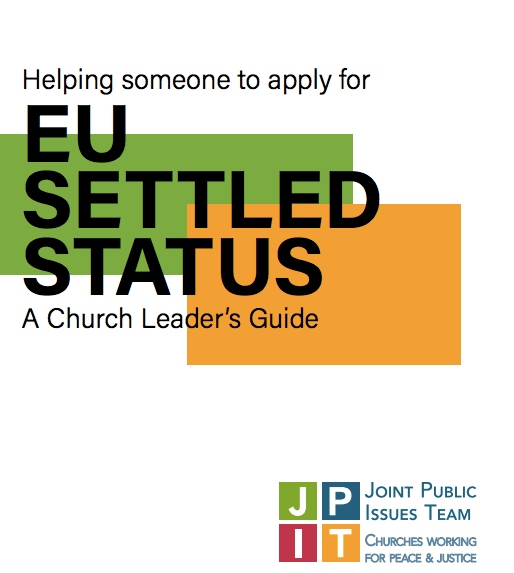Helping EU nationals stay in the UK post-Brexit
Many EU citizens who have the right to stay in the UK after the Brexit transition period may struggle to do so – which is why a campaign that enables churches to support applications to the EU Settlement Scheme has been launched by the Joint Public Issues Team. By Lucy Tiller
 There are more than 3.5 million EU nationals who have made a home in the UK. As well as the UK becoming a physical home, many EU nationals have also found their spiritual home here as UK churches have sought to make our communities welcoming spaces.
There are more than 3.5 million EU nationals who have made a home in the UK. As well as the UK becoming a physical home, many EU nationals have also found their spiritual home here as UK churches have sought to make our communities welcoming spaces.
In order for EU nationals to stay in the UK after Brexit, almost all need to apply for EU Settled Status before the end of June 2021.
Many EU citizens in the UK have already applied and have been awarded Settled or Pre-Settled Status. But for some people, the application process will be more challenging, especially as we enter a new lockdown. For example:
-
The application process is entirely online – but what if you don’t have access to a computer?
-
Part of the application involves proving residency in the UK – but what if you don’t have a fixed address, or have been homeless?
-
The application process is designed to be straight-forward – but what if you’ve been in the UK so long that you don’t even realise you need to apply?In these and a number of other situations, applicants to the EU Settlement Scheme may benefit from some support while they make their application.
The Joint Public Issues Team has teamed up with the immigration advice charity Settled to help churches understand how they can play their part. Resources have been produced to equip church and community leaders to support applications to the EU Settlement Scheme from more vulnerable EU nationals in our congregations and communities.
The resources explore key information, including:
-
The process of applying to the scheme and the kind of circumstances which might make an application more difficult.
-
The kinds of support which might be useful for some applicants, including offering access to the internet, contacting embassies for documents, and signposting towards charities and advice services which can help with certain circumstances.
Churches can provide a range of support. Technical support could be essential support for someone in your community or congregation who doesn’t have access to a computer, or struggles to use the internet. Perhaps you could help someone who has been homeless to gather as much evidence of their residency here as possible, including statements from charities, which could also make it easier for them to apply for housing and benefits in the future, should they wish to. Or perhaps you could just signpost someone to EU information booklets in their first language.
All of the information you might need, as well as links to charities, organisations, and resources available are linked as part of the resources. There’s also information specifically for churches based in Scotland, and for those working in homelessness outreach.
As churches, we’re called to create a society which welcomes everyone, and we value the contribution and presence of everyone in our congregations and communities. Supporting an application to the EU Settlement Scheme offers churches the chance to make the UK a welcoming place for everyone. Your support might mean that someone can stay in the place which they have made their home – both spiritually and physically.
If you’d like to find out more, join JPIT and Settled for an online coffee break at 11am on Friday 27 November. We’ll hear from charity Settled about the process and how you can support an application without accidentally offering unregulated immigration advice, and there will be time for questions – all in less than half an hour.
Lucy Tiller is an Intern (2020-1) with The Joint Public Issues Team
Baptist Times, 11/11/2020